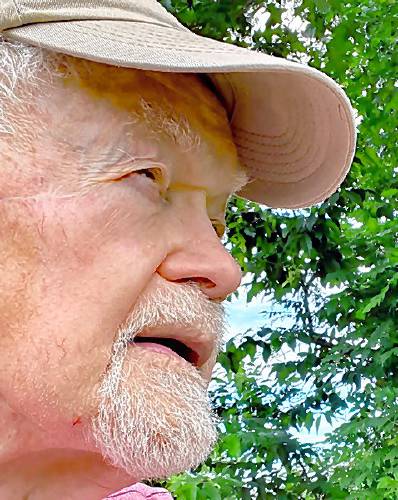Connecting the Dots: Silencing even the crickets

John Bos
| Published: 06-28-2024 5:00 PM |
They are so loud! With my sliding door to the patio open on warm nights, the collective cacophony of what? crickets? fills my living room, my ears and my awareness of sound not generated by neighbors or by nearby Silver Street traffic. I am in another world. A natural world undisturbed by people.
This chorus of cricket conversations (my sister thinks they are tree frogs) takes me to an awareness of what this land I am living on must have been like before we, the people, cut down so many trees to clear the land for “development.” Before we, the people, smothered so much of the breathable land with highways, shopping malls, industrial complexes and all the other earth-eliminating actions so “necessary” to create cities and the rest of our contemporary landscape obfuscating what was once what truly natural.
My column today is prompted, not for the first time, by my Monday morning writing group. We are eight distinctly different writers who are offered a wide variety of “prompts” by our writing group leader Pam Roberts to respond to in each, our own way.
My column today is prompted by a poem by Lisel Muller entitled “Losing My Sight” on Garrison Keillor’s “The Writer’s Almanac.” The last stanza of her poem reads:
Tonight the crickets spread static
across the air, a continuous rope
of sound extended to me,
the perfect listener.
Article continues after...
Yesterday's Most Read Articles
This prompted me to write:
The cricket chorus is amazingly loud, continuous and, in an odd way, harmonious. Were it recorded on a CD, I could not play it as loudly as I hear it penetrate the interior of my constructed condo quarters.
During the day, when I imagine the crickets are resting their voices, I continue my research into how our climate crisis is driving us down the road to an environmental Armageddon that will eventually silence those cricket voices. That will happen after the silencing of our human voices.
I write this belief at the start of a week forecast to reach intolerable levels of heat for many cities, towns and people. Unless you have an air conditioner. And if you do, unless the over-burdened electric grid can hold up in a weather environment it was not designed to handle.
How many people in this country, in this world, are really paying attention to the increasing evidence that we, the people, are causing the silence of crickets?
Record-breaking temperatures above 122º F were reported in the Indian capital of New Delhi and temperatures sizzled to an unheard of 127º F in parts of India and Pakistan.
Heat waves of exceptional severity and duration are now occurring simultaneously in parts of the United States, notably Miami and Phoenix which have recently been in the grip of intense heat events. In southern Mexico, endangered howler monkeys have been falling dead from trees in their tropical forests due to heat stroke and dehydration. In some places, birds and bats, not to mention human beings, are also dying from the heat.
The World Bank is projecting that by 2050, there will be more than 200 million climate refuges, 20 times the 10 million refugees that have already destabilized Europe. The climate crisis is also putting an increasingly heavy burden on our social safety net, which can ultimately cause social orders to begin to break down, generating chaos.
All of this is no coincidence. The hot and heavy hand of climate change is now upon us. Last year was the hottest on Earth in 125,000 years, and the concentration of heat-trapping CO2 in the atmosphere was the highest in four million years. And still climbing at an ever-increasing rate
Hundreds of climate scientists have recently forecast a strong possibility of hitting 2.5°C, which should hardly be surprising. For well over 30 years now, global leaders have failed to heed the warnings of climate scientists by moving decisively to phase out fossil fuels and their heat-trapping gases.
It could hardly be clearer that the world is already in the throes of a climate catastrophe.
By 2050, over five billion people, more than half the estimated global population, will be exposed to at least a month of health-threatening extreme heat when outdoors in the sun, with the majority living in poor countries in already hot regions like sub-Saharan Africa.
Here at home the fossil fuel industry and probably most Americans are working to mitigate our climate catastrophe so we can “maintain our quality of life.” That’s what will silence the crickets — maintaining our “quality of life.”
“Connecting the Dots” is published every other Saturday in this newspaper. John Bos is a contributing columnist for “Green Energy Times.” His essays about our climate crisis have been published in the Springfield Republican, Brattleboro Reformer and other regional publications. Comments and questions are invited at john01370@gmail.com.






 Connecting the Dots: It comes to us all
Connecting the Dots: It comes to us all Ira Helfand: A bomb survivors warn of nuclear danger
Ira Helfand: A bomb survivors warn of nuclear danger Michelle Spaziani: High municipal employee turnover merits immediate review
Michelle Spaziani: High municipal employee turnover merits immediate review My Turn: Massachusetts’ health system is failing
My Turn: Massachusetts’ health system is failing
